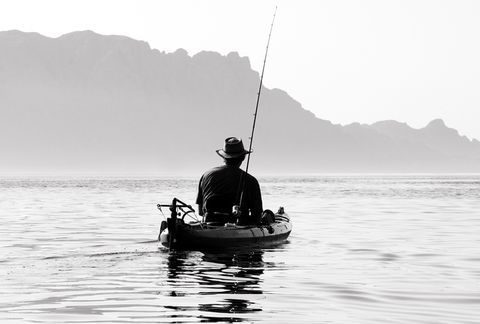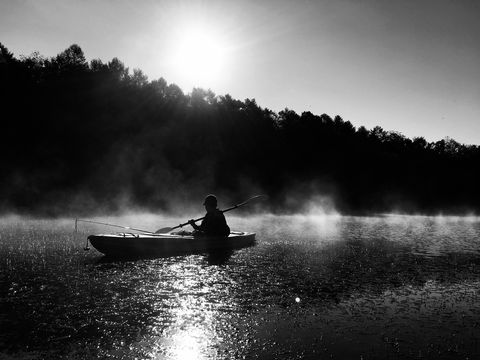Robert Field had owned a kayak for all of five months and paddled it into the open ocean just twice. Both times he had tagged along with more experienced anglers and ventured 4 miles out into the Gulf of Mexico, where the water was as flat as a millpond and the fish practically jumped into his boat. “King, mackerel, red snapper—they were bitin’ like crazy,” Field says. “And I’m thinking, ‘This offshore stuff, everyone acts like it’s hard. Clearly, I’m a natural.’”
For his third Gulf outing, he decided to head out alone and fish for sharks off the shore of Galveston, Texas. Undeterred by high winds and rough seas, Field paddled out and hooked a 6-foot black tip, which towed him a mile and a half before he reeled it in.
After releasing the shark, Field began the paddle back to shore, scanning the increasingly turbulent water for the float attached to the anchor he’d released when the shark started running. He was leaning in one direction when a rogue wave hit the other side of the kayak, ejecting him and upending the cooler of chum everywhere. Thus did Field find himself “thrashing in this pool of mullet blood in the sharkiest waters in the Gulf.”
He tried repeatedly, and in vain, to flip his capsized vessel while keeping his knees tucked up against his body. By shrinking his profile, he hoped the sharks would be less likely to notice him. A tropical storm was brewing, Field later learned, and the water was pulling him into one of the inlets dividing the barrier island near Gilchrist. “The current in those passes is crazy,” he says. “I’m hanging on to a $2,500 kayak with all this gear on it, but I thought, ‘Fuck it, I don’t want to die.’ And I started swimming to shore.”
Fifty feet from the kayak, and about a quarter mile from land, he had a change of heart and turned back. With one final surge of adrenaline, Field threw himself over the middle of the 12-foot boat, grabbed the opposite gunwale, hucked his weight backward, and flipped it right side up. Upon returning safely to shore, he was approached by a pair of coastguardsmen. Through binoculars, a woman had been watching Field struggle from her sea shell shop on the beach and called for help. “I apologized for wasting their time,” he recalls, “and they were super cool about it.”
He was humbled, scared, embarrassed . . . and exhilarated, which helps explain the decision he made a few years later to upend his life.

David Patrick ValeraGetty Images
The saying “Many men go fishing all their lives without knowing that it’s not fish they are after” has been famously misattributed to Thoreau. But another (and actual) Thoreau quote best captures Field’s frame of mind in his 20s: “The mass of men lead lives of quiet desperation.” Field went to college with the expectation that he’d follow in the footsteps of his father, a successful oil and gas engineer. But after five semesters at Texas A&M, he switched his major to psychology, with a minor in business. “I couldn’t stand engineering,” Field says. “I kept thinking, ‘I don’t want to work with these people for the rest of my life.’ ”
He went to work as the marketing director for a financial-advisory firm after college, attending night and weekend classes for his master’s in finance. But he spent nearly every waking hour daydreaming about being on the water. He had discovered kayak fishing in 2013, following a breakup with his girlfriend. “I had a lot more free time,” he says. “I wanted to do something outside, something that could help me stay fit, something adventurous.” He stumbled upon a video shot by Drew Gregory, an established angler with a signature line of Jackson kayaks and a web series called Hooked on Wild Waters.
In this particular episode, Gregory chronicled his journey down the Devils River. “He’s out there on the Texas–Mexico border, there’s rattlesnakes, he’s catching bass, and I’m like, I want to do that.”
Following unapologetically in Gregory’s wake, Field undertook an expedition down the Devils. His documentary of that adventure, distilled from 80 hours of video to 38 taut minutes, won Online Video of the Year in Kayak Angler magazine’s 2014 Choice Awards, and he was on his way. For two-plus years, he juggled a full-time job, his time-consuming hobby, grad school, and his girlfriend, once they got back together. Then came the week when it all fell apart.
“The universe wasn’t out to get me. It was trying to tell me something.”
In a span of five days in December 2016, Field’s girlfriend broke up with him again, instructing him to clear his ass out of their apartment; he lost his job as vice president of a start-up fishing-rod company; and his favorite uncle, an ex–aircraft mechanic and military buff, walked into a park on Pearl Harbor Day and shot himself.
“For a few days, I sat around, felt sorry for myself, probably drank more than I should have,” says Field, a contemplative 30-year-old redhead. With the help of friend and fellow fisherman Rex Guzman, he realized “the universe wasn’t out to get me. It was trying to tell me something.”
That message: Burn your neckties and live your dream. He decided to turn his avocation into his vocation. And what better time to try? “You have no dependents,” Guzman pointed out. “So if you go broke, you’re the only one who starves!”
Field devoted himself to filming, producing, editing, and starring in Field Trips, his heart-pounding, white-knuckle YouTube fishing show, which reaches tens of thousands of viewers weekly. In 2018 he doubled down on his bold decision, moving out of his south Florida home and into a 22-foot Grey Wolf trailer that he refers to as his “toy hauler.” He’s now on a quest to catch a fish in all 49 continental states, an epic journey that combines elements of Homer’s Odyssey, Hemingway’s The Old Man and the Sea, and Kerouac’s On the Road.
“I didn’t want to spend my life chasing money, building a bank account so I can be happy when I’m 65,” he says. “I’d rather be broke and wake up every day stoked about what I’m about to do.”

John Smith / EyeEm
Fishing’s great appeal, to hear Field tell it, is that it engages all his brain: “It forces you to become an amateur biologist, understanding the fish and why they’re doing what they’re doing; to be a botanist, under-standing how the plants in the water affect what the fish are doing. You have to be an amateur geologist—rocks and the layout of the earth around the water, that all matters.”
Fishing enforces a meditative connection to nature that’s at the heart of its timeless appeal. It explains why Norman Maclean discerned “no clear line between religion and fly fishing” in A River Runs Through It, and why Sir Izaak Walton’s The Compleat Angler, or the Contemplative Man’s Recreation has ranked third, since its publication in 1653, as the most printed text in the English language (behind the Holy Bible, which has some epic fishing scenes, and Shakespeare).
It’s also why fishing has been shown to ease symptoms of post-traumatic stress disorder. Operation WetVet, based in Miami, is a nonprofit founded by former Marine Osvaldo Martinez, who takes PTSD-scarred veterans fishing to help them “recognize good adrenaline rushes from bad ones,” according to a recent story in Angler’s Journal. “I want to replace the nightmare of the roadside bomb with catching a sailfish,” Martinez told AJ.
“When people ask me what my favorite species of fish is, I tell them: something I’e never caught before.”
Operation WetVet’s anglers were among the more than 51 million Americans to wet a hook last year. Where does Field, in terms of expertise, fall on that continuum? Near, but not at, the top. “I don’t pretend to be the best out there,” he says. “Some guys are bass fishermen, and that’s what they do. Some guys go after red fish. They’ve mastered that, and I’ve got a ton of respect for them. When people ask me what my favorite species of fish is, I tell them: something I’e never caught before.”
No matter the species, there might not be a purer way to fish than from a kayak. “When you’re blazing down the lake 60 mph in a boat,” Field says, “you’re not exactly stopping to smell the roses. You’re also scaring off a lot of wildlife.” Dolphins and sea turtles have swum right up to his vessel, and wild mustangs met him on the banks during a trip down the Pecos River in west Texas, where he spent a week sleep-ing amidst cacti and scorpions as he traveled down 60-odd miles of the river.
And when it comes to the actual fishing, kayaks can reach remote and shallow waters that larger boats can’t, meaning you have a better chance of landing fish that haven’t been harassed by other anglers. All the while you’re building muscle, burning calories, and getting a hell of a core work-out. It doesn’t take a 6-foot shark to pull you around on a so-called Nantucket sleigh ride, but the amount of fun is often proportion-al to the size of the fish. “When I hook in to a 100-pound alligator gar,” Field says, “I don’t have the upper hand.”
While a typical day of angling is eight hours, Field often finds himself on the water for 12 to 14, trying to catch enough fish for a video. Every so often, he says, “I have to remind myself not to let the pressure of making a living take away my whole reason for doing this in the first place.”
Income for food, gas, bait, and sundries comes from a variety of sponsors, including NRS (technical apparel), AccentPaddles, Railblaza (kayak accessories), YakGear (kayak rigging), and Fishbrain (a fishing social app). He earns revenue from YouTube, which pays on a per-thou-sand-views basis, and he holds out hope for the kind of major sponsor, like a truck or a travel-trailer company, that he says “would be life-changing.”
A new episode of Field Trips goes up every Tuesday at 6:00 p.m. Eastern, with behind-the-scenes episodes, or vlogs, airing some Thursdays at the same time. For those vlogs, he’ll spend time hiking and backcountry camping in national parks and monuments. He does not miss those neck ties.
And yes, Field makes occasional use of a dating site as he ranges across the republic, leading a friend of his to remark, over a recent lunch, “Don’t come knockin’ if the Grey Wolf’s rockin’…”
An embrace of the unknown is the ethos underlying Field’s journey. “This is about a lot more than just the fish,” he says. “So may people feel like they’re stuck in life, but that’s usually not the case. A lot of people are scared because they’re afraid of failure. Everyone says I’m living the dream, but this is much harder than 8-to-5 ever was. There’s more to it than sunshine and hook-sets, but this is my idea of success.”
Although not prosperous—he still eats ramen and makes frequent use of Boondockerswelcome.com to find free RV parking—Field is happier than he’s ever been. His videos are full of what Walt Whitman would have called “barbaric yawps”—“Whoa!” “Woohoo!” “What?!”—unleashed when a sturgeon or roosterfish or bull shark hits his line and sends adrenaline coursing through his body. If those joyful noises count as a kind of currency, he isn’t just happy. He’s rich.
Source: Read Full Article
